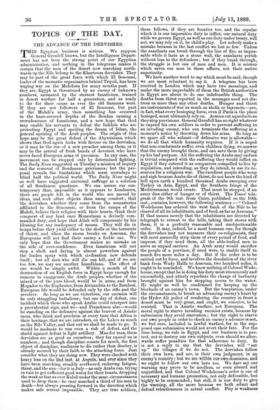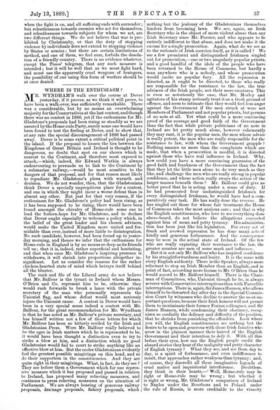TOPICS OF THE DAY. • THE ADVANCE OF THE DERVISHES. T HIS
Egyptian business is serious. We suppose General Grenfell knows, but the Intelligence Depart- ment has not been the strong point of our Egyptian administration, and nothing in the telegrams makes it certain that the men of the desert now marching north- wards up the Nile belong to the Khartoum dervishes. They may be part of the great force with which El Senoussi, leader of the monastic organisation behind Tripoli, has been waging war on the Mahdists for many months past. If they are, Egypt is threatened by an enemy of unknown numbers, animated by the sternest fanaticism, trained in desert warfare for half a generation, and as ready to die for their cause as ever the old Saracens were. If they are not followers of El Senoussi, but part of the Mahdi's army, then something has occurred in the haze-covered depths of the Soudan causing a recrudescence of fanaticism, and a new hope that God may enable his servants to defeat the Infidels who are protecting Egypt and spoiling the dream of Islam, the general uprising of the Arab peoples. The origin of this hope may be the great defeat of the Abyssinians, which shows that God again looks with favour on the dervishes, or it may be the rise of a new preacher among them, or it may be the arrival of fresh bands of devotees who have never faced European arms of precision. In any case, the movement can be stopped only by determined fighting. The Daily News suggested on Tuesday a mission of inquiry and the removal of Soudanese grievances; but the pro- posal reveals the limitations which seem nowadays to blind half the political world. The Daily News might as well have suggested universal suffrage as a solution of all Soudanese questions. We can assure our con- temporary that, impossible as it appears to Londoners, there are people left in the world who are moved by ideas, and seek other objects than smug comfort ; that the dervishes, whether they come from the monasteries affiliated to the Senoussia, or from the camps of the Mahdi, believe their religion with their hearts, think their conquest of any land once Mussulman a divinely com- manded duty, and hope that Allah will compensate by his blessing for any inadequacy of means. They will die in heaps before they yield either to the shells or the torments of thirst, and when the storm breaks on Assouan, the Europeans will not find their enemy a feeble one. We only hope that the Government makes no mistake on the side of over-confidence. Even fanaticism will not stop a shell, and daring is almost powerless against the leaden spray with which civilisation now defends itself ; but all men who will die can kill, and if we are too few, we may see another Isandhlana. The effect of one would be simply awful. Within a month of the destruction of an English force in Egypt large enough for rumour to exaggerate, the Arab peoples, whether of the mixed or of the pure blood, would be in arms, and from Mogador to the Euphrates, from Alexandria to the Zambesi, European life would be defended only by the rifle and the revolver. So long as we are victorious, our enemies will be only straggling battalions ; but one day of defeat, one incident which those who speak Arabic could interpret into a providential sign, and we—and Frenchmen also—would be standing on the defensive against the bravest of Asiatic races, who think and proclaim at every turn that Africa is their heritage, that we are intruders, on the Lakes as much as the Nile Valley, and that out we shall be made to go. It would be madness to run even a risk of defeat, and the shield against defeat is light artillery. Man for man, these dervishes are as good as ourselves ; they far exceed us in numbers ; and though discipline counts for much, the first object of discipline, readiness to die rather than disobey, is already secured by their faith to the attacking force. Just consider what they are doing now. They were checked with heavy loss on the 2nd inst. at Arguin, and ever since they have been marching steadily northward, enduring fatigue, thirst, and the sun—for it is July—as only Arabs can, trying in vain to get sufficient good water for their beasts, dropping the weak as fast as ever Kaled under the same circumstances used. to drop them—he once marched a third of his men to death—but always pressing forward in the direction which makes safe retreat impossible. They are true soldiers, these fellows, if they are fanatics too, and the repulse which it is our imperative duty to inflict, our natural duty while we govern Egypt, as well as our duty under treaty, will not, we may rely on it, be child's-play. Let nobody make a mistake because in the last conflict we lost so few. Unless the assailants can break through the line of fire, as impas- sable while it lasts as a stone wall, the assailants perish without loss to the defenders ; but if they break through,. the struggle is but one of men and men. It is science which saves our men in these affairs, not their native superiority.
We have another word to say which must be said, though we are most reluctant to say it. A telegram has been received in London which may have two meanings, and under the more improbable of them the British authorities- in Egypt are about to do one indefensible thing. The deaths from thirst reported in the messages need not dis- tress us more than any other deaths. Hunger and thirst are instruments of war as much as shells or bayonets,—are, in fact, what every besieging force, even if Paris is the place besieged, must ultimately rely on. Armies cut aqueducts as. they stop provisions. General Grenfell has no right whatever to expend his own soldiers in order to prevent suffering to an invading enemy, who can terminate the suffering at a moment's notice by throwing down his arms. So long as. we spare all who submit—if defensive war is allowable— we do all that which humanity requires. If it is urged. that non-combatants suffer, even children dying, we answer that the enemy brought them, and can save them by giving. up his bad purpose. All the suffering the Arabs may endure is trivial compared with the suffering they would inflict on_ Egypt if they entered it as conquerors compelled to live by requisition, and intending, as they do intend, to use its re- sources for a religious war. The excellent people who weep and sigh because Arabs die of thirst, do not know the kind of hell upon earth a hundred thousand Arabs sweeping over- Turkey in Asia, Egypt, and the Southern fringe of the Mediterranean would create. That must be stopped, if an army dies either of hunger or of thirst. The Times' tele- gram of the 9th inst. from Cairo, published on the 10th inst., contains, however, the following sentence :—" Colonel Wodehouse has ordered the west bank of the Nile to be- cleared of all its inhabitants, and of food, as far as Assouan."' If that means merely that the inhabitants are directed by- telegraph to retreat to the hills, taking their stores with them, it is a perfectly reasonable and unobjectionable. order. It may, indeed, be a most humane one, for though the dervishes may not massacre their co-religionists, they -will most assuredly strip them of every pound of food, and impress, if they need them, all the able-bodied men to serve as unpaid carriers. An Arab army would sacrifice the people of a province, if need were, to enable itself to march five more miles a clay. But if the order is to be carried out by force, and involves the desolation of the river bank from Wady Haifa to Assouan, two hundred miles, it ought to be rescinded. We know nothing of Colonel Wode- house, except that he is doing his duty most strenuously and successfully, and utterly repudiate the charge of barbarity brought against him for stopping access to the water. He might as well be condemned for keeping up the blockade of an enemy's town. But the temptation, under the circumstances, to break an advancing enemy's heart by the Hyder Ali policy of rendering the country in front a desert must be very great, and ought, we conceive, to be resisted. That is Asiatic warfare, not European. The moral right to starve invading enemies exists, because by submission they avoid starvation ; but the right to starve our own people in order to check an enemy's advance is not, we feel sure, included in lawful warfare, for in the sup- posed case submission would not avert their fate. For the time being, we rule in Egypt, and our business is to pro- tect, not to destroy our own subjects, even should we after- wards suffer penalties for that adherence to duty. It is not a reply to say that the dervishes will "eat up" the villages if we do not. The dervishes follow their own laws, and are, in their own judgment, in an enemy's country ; but we are within our own dominion, and we ought to follow our own laws too. We dare say our warning may prove to be needless, or even absurd and unjustified, and that Colonel Wodehouse's order is one of necessary and humane precaution, not only defensible, but highly to be commended ; but still, it is our duty to give the warning, all the more because we both admit and. defend relentlessness in actual conflict. Pity is weakness when the fight is on, and all suffering ends with surrender ; but relentlessness towards enemies who act for themselves, and relentlessness towards subjects for whom we act, are two different things. We do not believe that war is pro- hibited. by Christianity, or that the duty of stopping violence by individuals does not extend to stopping violence by States or armies ; but there are certain limitations of method, and one of them, we feel sure, forbids the desola- tion of a friendly country. There is no evidence whatever, except the Times' telegram, that any such measure is intended ; but it will be well that as we must fight hard, and must use the apparently cruel weapons of besiegers, the possibility of our using this form of warfare should be at once denied.



































 Previous page
Previous page